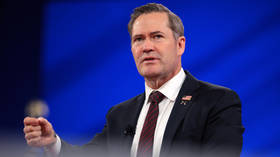The Remain establishment’s happy to see migrants crossing the Channel in dinghies because it has no respect for Britain’s borders

With asylum seekers arriving on a daily basis, anti-Brexit campaigners are relishing the failure of Britain to ‘take back control’ of its borders. This lack of acknowledgement for the UK’s sovereignty is an attack on democracy.
As far as Lord Ricketts, the former permanent secretary of the Foreign and Commonwealth Office is concerned, the problem is not illegal migration into Britain, but the “hollowness” of Brexit rhetoric. That’s his way of saying that we shouldn’t take borders too seriously.
Reading between the lines, it’s difficult to avoid the conclusion that there is more than a hint of schadenfreude in Ricketts’ assertion about the hollow aspiration of taking control of Britain’s borders.
Sections of the Remain establishment remain resolutely hostile to any manifestation of British sovereignty, and they can barely hide their delight at the Government’s difficulty in stopping cross-Channel migration.
Labour’s former Shadow Foreign Secretary David Miliband declared that managing the influx of migrants crossing the Channel will call into question the Leave campaign’s aspiration. “I think taking back control is put under the microscope here,” he observed.
While, for a significant section of British society, the entry of illegal migrants constitutes a problem, for sections of the Remain establishment, this development represents an opportunity to again call into question the Brexit project.
In effect, they are using illegal migration to make the point that Brexit cannot work and that the aspiration to take back control is, in reality, an infantile response to the so-called complexities of a globalised world.
As I argue in my bookWhy Borders Matter, the refusal to take borders seriously constitutes an indirect attack on democracy itself. The issue of border controls is not simply about who can and who cannot enter Britain, but who decides who becomes a member of our community.
Members of the Remain establishment are reluctant to allow a nation’s citizens to make that decision. Miliband and his co-thinkers take the view that the issue of migration is too complex for ordinary people to grasp. Consequently, they prefer international conventions and courts and non-governmental organisations to work out how to manage migration.
The experience so far indicates that international conventions and their interpretation ensure that illegal migration becomes de facto legal. That is why, at present, border controls, in many instances, have a ritualistic quality as far as migrants claiming asylum are concerned.
In the vast majority of cases, people who have entered Britain remain even if their claim for asylum is rejected. Once inside Britain, migrants are unlikely to face any serious consequences for their illegal entry.
The immigration policy of successive governments, both Labour and Tory, have relied on impression management to obscure the ineffectiveness of their approach. There are many reasons why their policy has proved to be so ineffective. But, arguably, previous policies have failed because they lacked clarity and moral authority.
In recent decades, influential currents in the media have succeeded in portraying the control of migration as immoral and inhuman. They’ve created an impression that border controls are both provocative and dangerous. During the Brexit debate, the term ‘hard border’ was used by both sides to convey a negative sentiment. But if ‘soft border’ is a morally superior option, then the argument for taking back control is lost.
Britain faces a difficult choice about how to deal with cross-Channel migration. However, whatever policy is adopted, it is essential that it’s one that is consonant with the aspirations of the public.
Also on rt.com Police stop RT interview with asylum seeker as we investigate the controversy of migrants living in hotels all around the UKThe UK needs a grown-up discussion about how to manage migration. And the most effective way of ensuring that any future policy enjoys legitimacy and the support of the public is to organise a referendum on the issues.
In this referendum, the people can decide whether it should be the laws enacted by the British parliament or international conventions that determine how migration should be managed. People should also be given the choice between supporting the enforcement of border controls by whatever means necessary or retaining the current regime of impression management.
If the UK’s citizens decide that borders are not a big deal and enforcing controls is not a major issue, that is fine, as long as they are prepared to live with the consequences of their verdict. But if they decide that borders do matter and that controls should be enforced, then they’ll provide unquestioned legitimacy for the project of taking back control.
The best response to the Milibands and the Ricketts of this world is for people to demonstrate that democratic decision-making is the other side of the coin of taking control.
Think your friends would be interested? Share this story!
The statements, views and opinions expressed in this column are solely those of the author and do not necessarily represent those of RT.















